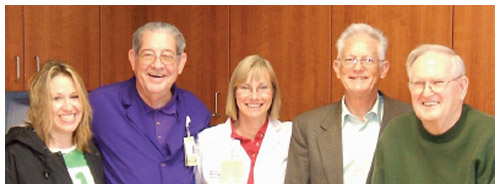Tracey’s Story: Bringing Speech Therapy to Life
As a speech therapist in Atrium Medical Center’s Rehabilitation Center, Tracey Wells, MS, SLP-CCC, witnesses a particularly devastating and frustrating result of a stroke – difficulty speaking.
Wells’ official responsibilities include rehabilitation, outpatient and acute care, as well as evaluation and treatment of people with communication deficits and swallowing problems. But every Tuesday, Wells gives up her lunch hour to hold a support group for speech therapy.
Bill Riggs, a loyal, long-time volunteer, approached Wells about 11 years ago with the idea of starting a support group. “Bill had a strong need to continue practicing the skills he had learned during speech therapy,” said Wells. With many years of speech therapy experience,
Wells knew that practice indeed is helpful when it comes to speech therapy. So she organized the support group that meets every Tuesday at noon in the Rehabilitation Center kitchen to “practice.” Wells said the only rule of the group is that “everyone gets a chance to talk.” The group continues to meet even when she is unavailable.
The group’s diversity is fascinating — young, old, male, female, employed, retired. What they share is an impaired ability to communicate. They all know the frustration, the anger and the discouragement that comes with not being able to verbally communicate their thoughts.
“For the most part, their cognitive skills are fine. They know exactly what they want to say; they just can’t say it,” said Wells. One support group member, a young mother, expressed her anxiety about starting a new job. Because her speech is slow and labored, she feared others would become frustrated with her. The support group was quick to remind her of the progress she’s made and assured her she would be fine.
The group met at a restaurant once. “We went to dinner and our waitress was very nervous,” Wells explains. “At first, she tried to communicate entirely through me, but I told her to direct her questions to the customers.”
Wells said the key principles to a support group such as this are understanding and practice. “The group members give to and get from each other an understanding of what each of them is going through, which is so important for confidence and community reentry. They offer each other suggestions and practice using the strategies they’ve learned during the treatment phase of their recovery,” she said.
Wells’ career path did not begin with speech therapy. “I started out in pre-veterinary studies but decided that wasn’t what I wanted to do. My mom is who suggested speech therapy,” she said. All of Wells’ patients are glad she listened to her mother!

Contact Us
Our rehabilitation team is ready to help you get back to the things that matter most in your life. We offer locations close to you throughout Southwest Ohio, in our hospitals and in outpatient facilities. Check out our list of locations, or call the number of the hospital near you to learn more about rehabilitation services in your area.

